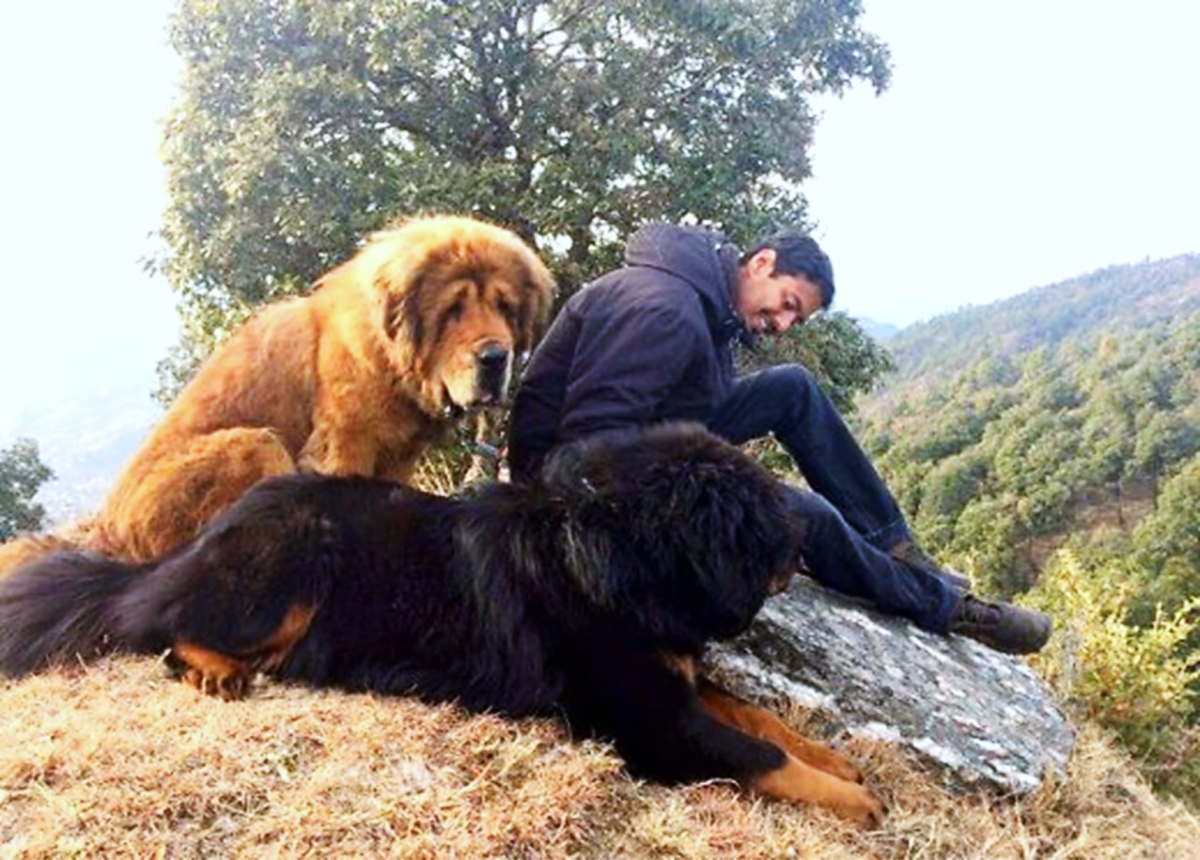How to Decide if You Should Get a Second Dog or Not
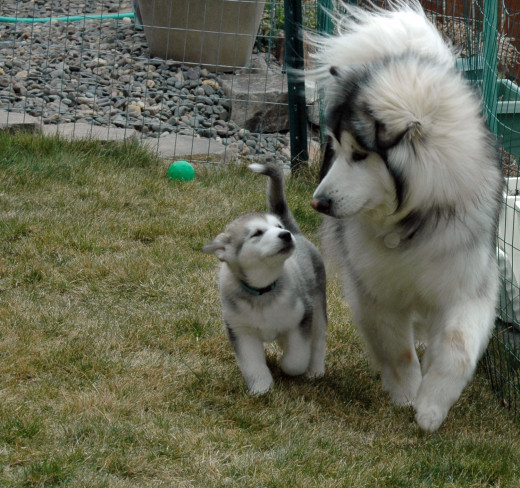
Adding Dogs to Households
While it may sound very simple just to add another dog to a household, it actually should be a major decision that is well thought out.
Much like having another child, adding a second dog to a household can either be very successful or turn into a nightmare. This author has experienced both ends of the spectrum.
While arguably it is always wonderful for dogs to have homes, introducing second (and third) dogs requires time and contemplation on the part of the owner for many reasons.
So how do you decide if you should get a second dog or not?

Reasons Why People Get a Second Dog
There are many ways that people acquire their pets and that will be addressed below. However, what are the reasons behind most people's decision to bring another dog into their home (which essentially means into the pack)?
- I want my dog to have a playmate
- I want to have a dog for myself since my spouse gets Bruno
- I love dogs and am really good at training them and taking care of them
- I think it would be fun to have another dog that is younger
- I think it would be fun to have a dog that was older
- I think it would keep my dog busy and he wouldn't be so demanding
- I think another dog would keep my dog busy while I'm gone all day
- I have 2 kids and I think both of them should have their "own" dog
While all of these reasons may have some merit, some of them are really not keeping the dogs' (either one) best interests in mind.
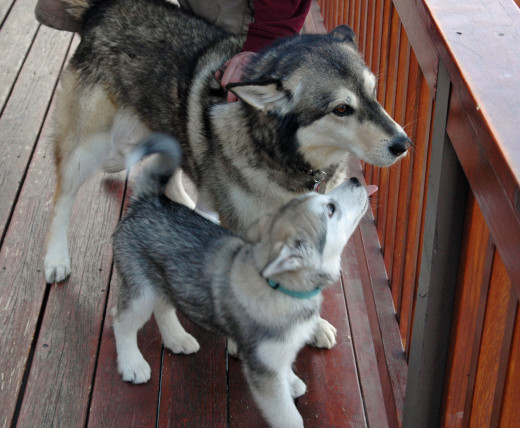

Getting a dog for a resident dog as a playmate may or may not work. I've seen it go both ways. Every dog has its own personality and every dog has its own dominance threshold. In other words, if you pick the wrong dog and she's an alpha--and you already have an alpha in residence--be ready for some fireworks. It may never end.
Wanting a dog for "yourself" is not a bad reason to get a dog or add another dog to a household. However, the type of dog may be an issue or again, personalities have a lot to do with acceptance when you bring a new dog into the mix. Best advice--know the breed, know the limitations and expectations and go into this adventure with your eyes wide open.
If you happen to be in love with dogs (as this author is) and you are really good at training them and taking care of them, that's not a bad reason for wanting to add a second dog. However, reason has to play some role in this decision and things like cost of care, time for exercise, dog personalities, etc. all have to factor in. Usually though the trained dog owner knows what he or she is getting into before taking on another dog. It is important to note though that it is best if the rest of the household agrees with this decision!
Getting a younger dog because you have an older dog may or may not backfire. Older dogs become fairly set in their ways and don't take kindly to younger dogs coming into "their" space. There may be some period of adjustment and it may not all be pleasant. That said, we did introduce a young buck malamute to a very old alpha malamute and it did work beautifully. However, there were some skirmishes as Denaya put Griffin promptly in his place for "unwanted" behaviors. In this case it was a happy ending but it took discipline and respect for our older dog's limitations to make it work.
If you have a young dog who is needing attention and training and you bring home an older dog, it can reverse some of your teachings. It can also lead to some of the above conflicts simply because no matter what age, every dog is going to be different and have their own space and their own ways they like things done. Really old dogs may also have health issues and having a young dog constantly interacting with an older dog may have its pros and cons. I do know families though where it's worked both ways--introducing a younger dog worked and introducing an older dog worked. It's all about the personalities and a little about the breeds as well.
Keep in mind that playmates are one thing. Babysitters are quite another. Dogs who are bored, left alone too much, bark too much, dig too much, run away, or are otherwise known behavior problems are not going to improve by the introduction of another dog. In fact, they may get worse. They may resent the other dog and be spiteful or mean towards him or her. Or the new dog may adopt the same behaviors as the resident dog and now you may have twice the problem.
Two dogs can get into twice as much trouble as one dog. This author is aware of this fact most acutely. Two dogs can tear off a fence board faster than one and escape to parts unknown and come back skunked 14 hours later. People who are gone all day probably should not have dogs in my humble opinion as it is too easy for the dogs to become bored and get into trouble. At the very least, if people are going to be gone all day, they should have a plan in place for their dogs to make sure they are safe in the first place and secondly that they can be left alone without it impacting their behavior. This is the most common reason for dogs who end up in shelters--because people have them when they do not have time to care for them. It would be the same as leaving a child all day in the backyard at 2 years old and going to work--and expecting nothing to go wrong.
This author has had as many as four dogs at the same time. Having three children, it did work out that someone always had a dog it seemed lying on their bed at night but in all truth, no one really "had" a dog for themselves. Dogs may pick a person that they seem to gravitate towards but there are no hard and fast rules on this. It again depends on the breed and the personality of the dog. For instance, this owner's three malamutes would love anyone who offered them a ride or walked in the door. They are just that social. They do display "preference" for one or the other adults sometimes but as a general rule, getting a dog for a specific person usually works the opposite way. The dog decides to like someone better instead.
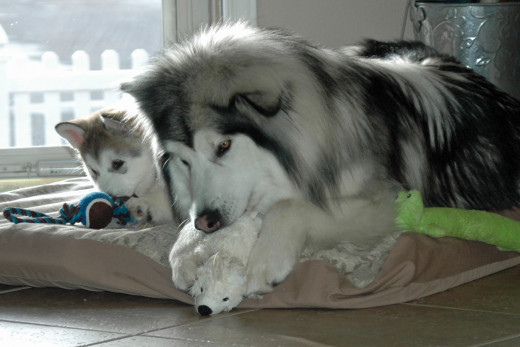

Questions to Ask Yourself Before Adding that Second Dog
- Can I afford to feed a second dog?
- Do I have enough space for a second dog?
- Will I be able to exercise both dogs appropriately?
- Can I transport both dogs in my car if I need to or what is my plan?
- What kind of dog do I already have? What is his or her status--alpha or omega?
- Do I have enough dog equipment for a new dog plus my resident dog? What will I need to buy to make sure I have stuff for both dogs?
- What breed of dog am I thinking of adding to the household?
- Do I know anything about the breed of the dogs that will be coexisting?
- Can I afford vet bills for 2 dogs?
- Will I be able to train a second dog or need help training him or her?
- Am I going to introduce a puppy, a yearling dog or an older dog?
- Is the dog I plan on getting from a rescue situation? If so, do I know all the dog's issues and am I prepared to deal with them?
- For people with children--do you have enough time to devote to two dogs and your child or children?
- Do I have a "safe" place for both my dogs if they need to be separated?
- What is my plan if things don't work out?
- Will our household be affected by the addition of this dog and how? Small children can become needlessly injured by dogs squabbling over their role as leader of the pack.
- Do I have the time to introduce a new dog slowly and appropriately to make sure things get off to a good start and there are no problems?
- Will the dog be spayed or neutered before I bring him or her home? If not, can I afford to do this right away?
These are just some of the thoughts that should be in the mind of a person thinking about adding a dog to a household. Oftentimes things do go splendidly well and there are no problems whatsoever. But other times, there are terrible consequences which can manifest themselves as dog fights, dogs getting bitten or hurt and even owners and children getting hurt because proper steps weren't taken introducing a new dog to the household. This author was bitten the first night we had Denaya our rescued malamute when I had to separate her from my resident dog whom she decided she wasn't ready to know. I thought I had introduced them properly but in retrospect, I didn't allow enough time for them to prove they could be okay together.
Keep in mind that it can take months for a new dog to acclimate himself or herself into a family situation with another dog especially if he or she was a rescue dog. Our older malamute Denaya mentioned above fought literally tooth and nail with our other dog for months to the point where we had to keep them separated or at least be vigilant with them at all times before she relaxed and decided to quit exerting herself as the alpha. It was a very tense situation to say the least and had we had small children, I might not have been able to keep her. However, my only option and the only consideration I would have permitted was to return her to the rescue group and never to give her to anyone else or take her to the shelter. Luckily, with a lot of training and patience, it did work out with a happy ending.
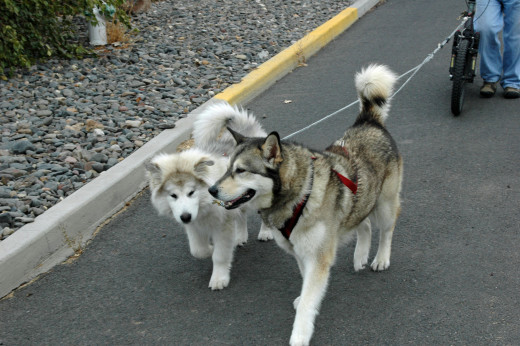

"Tails" of Adding Second Dogs
I have talked my way into more dogs than most people. Luckily, I have a loving husband who trusts my judgment and knows that I will make sure the dogs do get along and that they are well trained.
That being said, my dogs also always know who is alpha in terms of their human counterparts and that does make a tremendous difference. However, within their own little part of the circle or the pack, one of them has to be the alpha and one has to be the omega. It is essential to make sure you select a dog with a personality that will blend with your first dog rather than cause friction nonstop or you will find the situation most unpleasant.
As mentioned earlier, introducing a young male malamute puppy (who was very large which helped) into a household with a single, older, rescued malamute was certainly interesting. We had learned over the years from experience that Denaya has issues with food and she always will. We simply took that out of the equation, never feeding them together or putting them into a situation where she would need to fight for herself. She did, however, dominate Griff from the beginning but being a happy go lucky kind of fellow, he has never shown any tendency to challenge her alpha status. Yet his "boyish" behaviors such as trying to mount her a few times earned him an upside down view of the sky and a dog at his throat. He quickly got the picture and no harm was done.
Although it is a bit different in that we now have three malamutes, it was a similar situation introducing a very small female puppy into our household two years ago. Griffin had established himself in his own way as second in command and now we had a very tiny malamute puppy who was very headstrong thrown into the mix. Many breeders and dog owners will say that females also have a problem with other females but fortunately for us, our breeder picked the right dog for the situation.
Gabby is a very flamboyant, stubborn malamute but she has one very lovable trait--she has no desire to be an alpha. She is very submissive and "knows her place" with respect to the two other resident dogs. She never made any effort growing up to exert herself or to be seen as a threat to their position so they both accepted her as if she had been here all along. That is not to say that they have not had a few moments where someone let her know she was on the bottom rung, but it has never been an issue for any of them coexisting and they do so happily. It's really an amazing hierachy that they established themselves with us at the top of the ladder but we have taken great pains to not put them into situations where they could fail or feel that they needed to take charge of each other or the situation.

Tips on Introducing the Second Dog
No one's situation is exactly the same just as no dog will ever be predictable in their reaction to a new situation or a new dog. Here are some general guidelines and what you should watch out for.
- Go slow and be aware that dogs don't act like people--they can react before you realize it and it may be with aggression
- Wagging tails mean nothing--they can stop on a dime and the next second grab the other dog and go into attack mode
- We introduced our dogs on a bit by bit basis and made sure we were at the ready to jump in and rescue the dog (especially a puppy) so a leash might even be appropriate to grab the dog out of harm's way
- Don't encourage the dogs to spend lots of time alone until you are 100% sure that they truly get along--leaving them outside to "work it out" probably will backfire if one or the other is showing any signs of aggression or fear
- Be sure to not make things like toys, food, beds, etc. an issue--Griffin was 1-1/2 years old when we brought in a very small puppy and toys were still very much in his daily routine. We provided ample buckets of toys and chew things for both of them and they seemed to tease each other with them but have never fought over them
- Bones and food can cause even the most docile dogs to go wild and while some mal owners have great success with bones, antlers and food in an "open" setting amongst the pack, this owner just doesn't do it--not with a rescue dog on board. These things are given to them in a confined spot where no one can threaten the other and no arguments can take place over who gets which thing--if toys had been an issue, we would have proceeded along the same lines
- Everyone gets equal love and affection--while we may love our dogs for different reasons as each has a special personality, they are all treated equally as much as humanly possible
- Both dogs/all three of our dogs get equal exercise though if something is too strenuous, we sometimes have to leave our older girl home to protect her. For the most part though, we adjust the exercise to their age. For instance, when Gabby was a puppy, she was allowed to walk behind the scooter and not pull--much as Denaya is now as well--pulling without weight is okay in both circumstances while pulling with weight can be detrimental to their well being at a specific age
- Vet care is ongoing for the dogs as is grooming when necessary though we do a lot of it necessarily ourselves to keep down the cost
- Each dog's uniqueness is always at the forefront of what activities and situations we expose them to--we know Griffin is afraid of snarling dogs so we try to minimize his exposure or at least off leash. We usually separate the dogs so if an aggressive dog approaches, someone can devote attention to Griffin and getting him worry free. Denaya has issues with food so we take precise care not to have children waving food in her face and we never leave food out for any of the dogs. They are fed separately thus reducing the possibility of a literal food fight
- Gabby being on the submissive side, we take great pains to make sure other dogs do not try and dominate her or get overly aggressive with her though this hasn't been a problem because she so easily understands other dogs' personalities
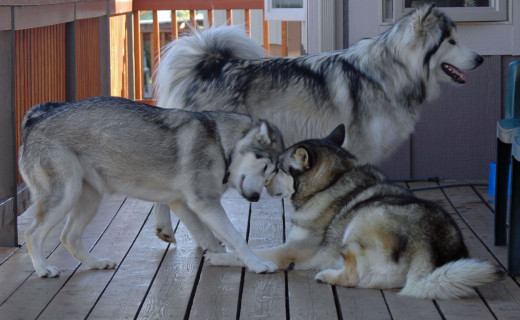

Having More Than One Dog
As a multiple dog owner for decades, this author applauds two-dog families (and three dog, etc). However, the most important thing to remember is that the owners have to be in tune with both dogs and have to know the score when it comes to dog care and dog behavior.
Much like bringing home a second child, there are always adjustment periods. There are almost always some minor jealousies and perhaps some favoritism whether accidental or intentional. The most important thing to remember is that in most family situations, we make adjustments and the whole family unit learns to synch with the new famly member. It's no different in the dog world.
Whether a puppy is your choice for a second dog or an older dog or somewhere in between, the dog will need to get to know his surroundings and his new family and very importantly, he will need to get to know his new "brother" or "sister" in the pack. That takes patience on everyone's part though dogs do have a system for working these things out. Whether they are pleasing to their human roommates or not remains to be seen in each individual case.
Very crucial to success when getting a second dog is education on the part of the dog owner and his family. Knowing what to expect is half the battle. Being prepared to deal with anything is the rest of the puzzle. If you haven't thought it through thoroughly, you may be in for a bit of a wild ride. That said, however, go with your instincts. No matter of reading about it can prepare you for real life dog integration. It's a matter of finding what works best for every situation.
Being sure of the soundness of the decision to get a second dog is priceless and one less dog that will probably end up in a shelter being euthanized. Decide wisely and your life will probably happily never be the same.






